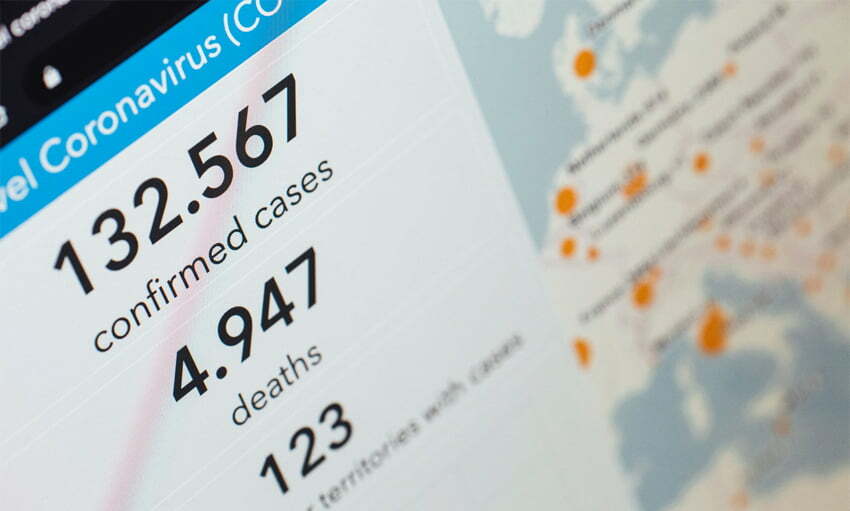Surprising Statistics
When coronavirus spread worldwide, countries responded at different times and in many ways. Not all countries had equal chances to get prepared. A few of them, according to some, failed to do the right thing. Hotels couldn’t escape the pandemic impact either. According to McKinsey&Company, the hotel industry is one of the most affected by the COVID-19 pandemic. Although the fate of hotels remains uncertain, the best solution for now is to follow events, collect data and draw conclusions. However, you don’t need to make any effort because we have already done that for you. This article shows the most interesting statistics from the hotel industry in specific countries while providing some hints on how to get ready for the future.

The COVID-19 pandemic began in China. The first cases of the disease (which was unknown at that time) were diagnosed at the end of 2019. However, the local authorities weren’t aware of the imminent threat. STR reports that the hotel occupancy rates amounted to 69% in mid-January 2020, but dropped to only 8% at the end of the month. The beginning of the lockdown period coincided with the Chinese New Year celebration. As a result, the time which would have been the most profitable for hotels under normal circumstances suddenly turned into a dead season. Other countries could follow the developments in China and make some preparations in case coronavirus emerged among their own citizens. What were the effects?
Japan was one of the first countries stricken by coronavirus. Infection rates grew slowly and steadily most likely due to the countermeasures taken just in time. As OECD states, the hotel industry recorded an occupancy rate of only 53% in February 2020. Postponing the Tokyo Summer Olympics made these matters worse. However, the Japanese authorities have often shown their ability to act effectively in such situations. OECD adds that the local government is preparing 1 trillion USD to aid all industries, including tourism, giving interest free-loans and planning to invest 2.2 billion USD to bring back tourists after the pandemic ends.
Are the United States, which have been known for their economic superiority, coping as well? Unfortunately, the current events aren’t going easy on them. AHLA provides CBRE’s opinion that the year 2020 is the worst for the local hotel industry. The cited forecasts also state that the situation will become even worse than during the Great Depression in 1933. The disastrous effects won’t keep us waiting. AHLA also presents the devastating statistics provided by Oxford Economics and Hotel Effectiveness: almost 1.6 million hotel workers have been dismissed, and the industry itself recorded a loss of 2.4 billion USD in weekly lost wages. The situation didn’t get better after the April anti-lockdown protests and the ongoing protests related to the Black Lives Matter movement. Although the latter may lead to positive social changes, they also might result in increasing the number of coronavirus cases and prolonging the pandemic.
Where is Poland in all of this?
Unfortunately, the coronavirus pandemic didn’t leave us out, and the hotel industry was strongly affected. According to the data provided by Statista, up to one-third of Polish hotels recorded more than 50% of cancellations in Q1 2020. After the lockdown started, the majority of Polish hotels were closed. However, some hotel owners decided to do something for the greater good. Money.pl informs that many hotel rooms were given free-of-charge to medical staff who were fighting against the COVID-19 pandemic. We hope you will remember this huge favour these hotel owner did us all.
While the world was struggling with coronavirus, some peculiar cases came out into the open. Forbes pointed that the countries doing very well during the lockdown are led by… women. These include Germany, Taiwan, New Zealand, Iceland, Finland, Norway and Denmark. In Germany, Chancellor Angela Merkel took some firm actions. She managed to reduce the number of deaths due to COVID-19 to 2,673 (data from ECDC as of 12 April 2020). This is a relatively small number when we consider the population of Germany and compare it with other countries. The hotel industry also escaped from the crisis almost unharmed. According to OTA Insight, 61% of hotels in major German cities had to close during the lockdown. However, about 90% of hotels got back to business at the end of May 2020. This will allow visitors, for example, to stay in Munich and try the famous Weisswurst (a kind of sausage).
We cannot clearly determine when the coronavirus pandemic ends. Fortunately, some restrictions have already been lifted and the hotel industry is gradually starting to go back to normal. China was the first victim of COVID-19, so it is one of the first countries to slowly get back on track. STR shows that although the hotels occupancy was less than 8% on 31 January 2020, the occupancy level went up as high as 14% on 1 March. It is a good idea to observe other countries and draw conclusions when managing a hotel. We are fully aware that collecting information can be a time-consuming process. We had to spend many hours searching for data, analysing statistics or reports and preparing this article. However, if you want to automate these operations within Revenue Management at your hotel, you might want to invest in proRMS which will do such work for you much faster than any human could.
References:





